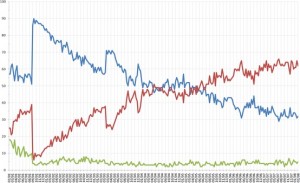It doesn’t take a lot of marketing research to determine that people are very skeptical about marketing research.
Many people don’t understand how surveys are constructed and interpreted and, based on their inaccurate perceptions, often dismiss the results. As a potential client recently said to an IQS executive, “Why should I pay a research firm when I know that 100% of the people will check a 1?”
The answer, of course, is that you shouldn’t pay a research firm if 100% or their respondents gave the same answer to a question. But, a well-written survey skillfully performed on a representative cross-section of the population almost never results in unanimous answer sets. Really the answer is that it never happens but in theory there is a infinitely small chance that it could.
There are many misperceptions about marketing research. Here are five things that don’t happen when a survey is professionally constructed and administered:
- 100% of people will give the same answer to a question. The true value of a investing in marketing research is in being able to effectively act upon the insights gleaned from the fact that 60% of survey respondents checked the “partially satisfied” box..
- People will never check a “5” (on a 5-point scale), since “no one is perfect.” In certain cultures (Germany and the UK, for example), it’s true that people rarely check a “5” or “totally satisfied” box on a survey. That’s not the case in the United States, however. Long-term results from multiple studies have shown that less than 5% of US respondents refuse to provide “end point” answers when they are appropriate.
- Only angry people will respond. Common sense will tell that most people truly furious with a company won’t waste their time responding to its surveys. They have no intention of doing further business with the firm. Plus, if only angry people responded to surveys, how can the thousands of positive study results be explained?
- Dissatisfied people will check all 1’s even if part of their experience was positive. Similarly, customers who are dissatisfied with some aspect of a company’s product or service do not indicate total dissatisfaction with that part of the experience when surveyed. However, the questions on the rest of the survey typically receive fair ratings. The vast majority of people understand that there are complex components in any relationship, and most want to their specific grievances heard.
- People will lie. While total honesty is impossible, very few people lie on surveys. The rule of thumb within the marketing research industry is that 90% of the people are 90% honest. After all, they are investing their valuable time and energy completing a lengthy questionnaire. A total distortion simply isn’t worth all that effort? Furthermore, when people do lie, they tend to do so in very predictable ways. For instance, when asked to self-report height and weight we find that people indicate they are taller than they really are and weigh less. The key is that even in this case the responses are detectable and predictable.
The fact is that most of the people who both invest in and participate in marketing research see the value it provides. Companies get the insights they need to improve their offering while customers enjoy the resulting benefits.
Survey says, “Win, win.”





